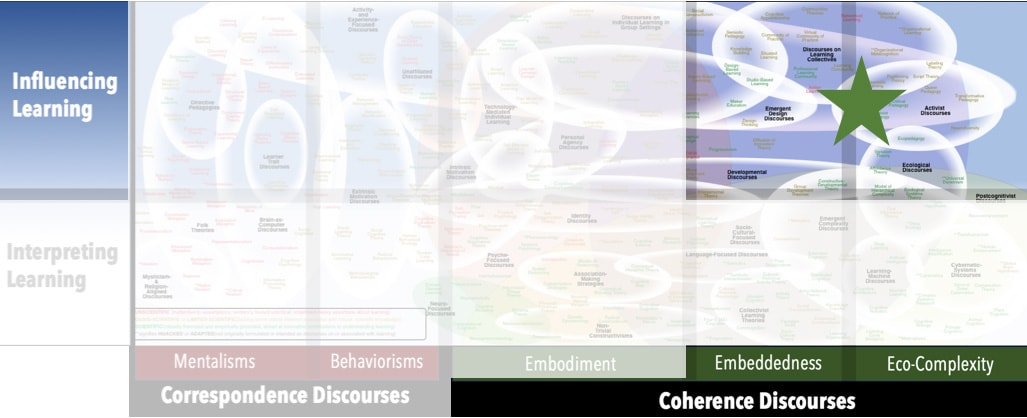Focus
Extending notions of justice to the more-than-human worldPrincipal Metaphors
- Knowledge is … sum of the dynamics that contribute to systemic self-maintenance
- Knowing is … planetary consciousness
- Learner is … a change agent (individual, social, cultural)
- Learning is … interrogating (prevailing anthropocentric belief systems) and participating (in efforts to enact meaningful change)
- Teaching is … learning alongside (i.e., interrogating and co-participating)
Originated
1970sSynopsis
An outgrowth of Critical Pedagogy, Ecopedagogy is concerned with understanding and enacting forms of justice that encompass all living forms in the more-than-human world. It distinguishes itself from the sensibilities that underpin “environmental education” and “education for sustainable development,” which are seen as perpetuating anthropocentric and capitalist ideals. In contrast, Ecopedagogy aims to foster a “planetary consciousness” that is grounded in ecoliteracy (conceptual understanding of Earth’s life-enabling natural systems), motivated to respond to growing ecosystemic pressures, and oriented toward remaking economic and political systems. Ecopedagogy is aligned with concerns of Critical Pedagogy (see also Activist Discourses) and particularly attentive to topics addressed in Cognitive Biology.Commentary
Ironically, even as Ecopedagogy defines itself in contrast to globalist ideologies (e.g., neoliberalism), it presents itself as one. Consequently, a broad embrace of its agenda might actually entail a suppression of non-Western sensibilities and knowledge.Authors and/or Prominent Influences
Paulo Freire; Richard Kahn; C.A. BowersStatus as a Theory of Learning
Like Critical Pedagogy, Ecopedagogy is not a theory of learning, as it does not address the complex dynamics of learning.Status as a Theory of Teaching
Ecopedagogy is a theory of teaching that is oriented toward recognizing and taking constructive action to counter anthropocentric thinking, capitalist impulses, and their consequences. Teaching emphases include the coupling of conceptual understanding and practical action (praxis), the coupling of social justice and ecoliteracy, and urgency.Status as a Scientific Theory
Ecopedagogy does not meet our requirements of a scientific theory. However, it is informed by prominent and empirically grounded theories Embeddedness Discourses and Eco-Complexity Discourses.Map Location

Please cite this article as:
Davis, B., & Francis, K. (2023). “Ecopedagogy” in Discourses on Learning in Education. https://learningdiscourses.com.
⇦ Back to Map
⇦ Back to List
